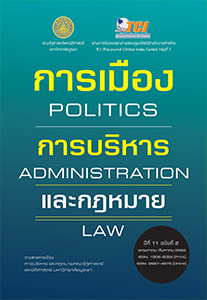Legal Measures on Elder Abuse in the Context of Elder Fraud: A Comparative Study of Thai and American Law
Keywords:
The protection of the elderly, Elder abuse, Elder fraudAbstract
This research paper is aimed to study legal measures on elder abuse in the context of elder fraud by conducting a comparative study of Thai and American law. The study includes the definition of elder, elder abuse, concepts, theories concerning elder fraud and relevant Thai and American laws in order to analyze the problems of criminal law enforcement on elder fraud and wrongful exploitation of the elder, reach a conclusion and suggest amending the criminal law and the laws relating to the elderly in Thailand. According to relevant laws in Thailand and the United States, it is found that both countries endorse the protection, promotion and support of the elderly in accordance with the international principles of the United Nations. In Thailand, the elderly’s basic rights are determined according to the Constitution and the Declaration of the Elderly, the definition of “elderly” in Thailand is set at the age of 60 which is based on the age criteria according to the Act on the Elderly, B.E. 2546. On the other hand, according to criminal law in California and Florida, the definition of “elderly” is set at the age of 65. The criminal liability of elder-abuse offenders in the United States law is more specific and provides higher protection than Thailand’s. Thai Criminal Code and its provisions provide protection in general; however, there is no special protection for elderly victims. Elder financial fraud is considered as unlawful exploitation; therefore, the federal government of the United States enacted Elder Abuse Prevention and Prosecution Act (EAPPA) in 2017 in order to prevent and suppress fraud against the elderly. The acts which are deemed to be elder financial fraud and wrongful exploitation of the elderly under the criminal laws of California and Florida have been clearly and specifically defined. For instance, the laws identify the nature of fraud and wrongful exploitation against the elderly, the offenders are classified as legal caregivers who are family members or others whom the elderly trust in business term,criminal penalties and heavier penalties in terms of imprisonment or fines for any property damage that the elderly have lost, etc. In conclusion, the United States of America provides law regarding elder fraud with special protection for the elderly who are victims while there is still no provision that provides any special protection for the elderly in Thailand. Therefore, Thai criminal law and other related laws regarding fraud should be revised by determining penalties for the offender who is a caretaker but not a family member that seeks unlawful benefits from the elderly. Since Thailand is encountering aging society, it is suggested that Thai criminal law should be amended by adding the definition of the elderly in Section 1, adding Section 342/1 and the term of the elderly in Section 346. In addition, the term “illegal exploitation” pursuant to the announcement of the Ministry of Social Development and Human Rights in accordance with the Act on the Elderly, B.E. 2546 should be added for clarity and prevention of legal misinterpretation. Moreover, the elderly shall be protected in accordance with protection of personal rights, the Constitution of the Kingdom of Thailand as well as international law.
References
เกียรติขจร วัจนะสวัสดิ์. (2550). กฎหมายอาญาภาคความผิด เล่ม 3. กรุงเทพฯ: ห้างหุ้นส่วนจำกัด จิรรัชการพิมพ์.
เกียรติขจร วัจนะสวัสดิ์. (2551). คำอธิบายกฎหมายอาญา 1 (พิมพ์ครั้งที่ 10). กรุงเทพฯ: พลสยาม พริ้นติ้ง.
คณะกรรมการผู้สูงอายุแห่งชาติ. (2553). แผนผู้สูงอายุแห่งชาติ ฉบับที่ 2. วันที่ค้นข้อมูล 29 มกราคม 2562, เข้าถึงได้จาก http://www.senate.go.th/w3c/senate/pictures/comm/1549/file_1464348794.pdf
คณิต ณ นคร. (2549). กฎหมายอาญาภาคความผิด (พิมพ์ครั้งที่ 9). กรุงเทพฯ: วิญญูชน.
จิราพร เกศพิชญวัฒนา และสุวิณี วิวัฒนวานิช. (2552). ความรุนแรงต่อผู้สูงอายุไทย: การทบทวนองค์ความรู้และสถานการณ์ในปัจจุบัน. วันที่ค้นข้อมูล 3 มีนาคม 2562, เข้าถึงได้จาก http://thaitgri.org/?p=37285
จงจิตติ์ ฤทธิรงค์. (2560). การพิทักษ์คุ้มครองสิทธิของผู้สูงอายุ. จดหมายข่าวประชากรและการพัฒนา, 37(4).
ชฎาภาษ์ เหมือนแท้. (2559). การคุ้มครองผู้เสียหายที่เป็นผู้สูงอายุในการดำเนินคดีอาญา. วิทยานิพนธ์นิติศาสตรมหาบัณฑิต, สาขานิติศาสตร์, คณะนิติศาสตร์ จุฬาลงกรณ์มหาวิทยาลัย.
ชยธร วิชาโคตร. (2553). ปัญหากฎหมายเกี่ยวกับความผิดฐานฉ้อโกง. วารสารนิติศาสตร์ มหาวิทยาลัยนเรศวร, 3(1), 138 – 149.
ทวีเกียรติ มีนะกนิษฐ. (2551). คำอธิบายกฎหมายอาญา ภาคความผิดและลหุโทษ (พิมพ์ครั้งที่ 4). กรุงเทพฯ: วิญญูชน.
มหาวิทยาลัยมหิดล, ส. (2561). ประชากรของประเทศไทย พ.ศ. 2561. วันที่ค้นข้อมูล 2 มีนาคม 2562, เข้าถึงได้จาก http://www.ipsr.mahidol.ac.th/ipsrbeta/th/Gazette.aspx
สุรศักดิ์ ลิขสิทธิ์วัฒนกุล. (2548). คำอธิบายความผิดเกี่ยวกับทรัพย์ ตามประมวลกฎหมายอาญา(พิมพ์ครั้งที่ 4). กรุงเทพฯ: วิญญูชน.
สำนักข่าวกรมประชาสัมพันธ์. (2561). พม.จับมือภาคีเครือข่ายจัดเสวนาวิชาการ “สิทธิของผู้สูงอายุไทยในสังคมผู้สูงอายุอย่างสมบูรณ์”. วันที่ค้นข้อมูล 25 กุมภาพันธ์ 2562, เข้าถึงได้จาก http://thainews.prd.go.th/website_th/news/news_detail/TNSOC6102210010077
Association. (2017). President Trump signs Elder Abuse Prevention and Prosecution Act to enhance protections. Retrieved March 15, 2018, from https://www.americanbar.org/publications/governmental_affairs_periodicals/washingtonletter/2017/october/elderabuse.html
Burns et al. (2017). Be Alert for Financial Exploitation of the Elderly. Florida Bar Journal,91(8), 37-39.
Coombs, J. (2014). Scamming the Elderly: An Increased Susceptibility to Financial Exploitation within and outside of the Family. Albany Government Law Review, 7(1), 243–266.
Crome, P., Moulias, R., Sánchez-Castellano, C., Tilvis, R., Arora, A., Busby, F., . . . Cruz-Jentoft, A. J. (2014). Elder abuse in Finland, France, Spain and United Kingdom. European Geriatric Medicine, 5(4), 277-284.
FBI. (2018). Elder Fraud. Retrieved April 17, 2018, from https://www.fbi.gov/news/stories/elder-fraud-charges-announced
WHO. (2002). The Toronto Declaration on the Global Prevention of Elder Abuse. Retrieved March 6, 2018, from http://www.who.int/ageing/projects/elder_abuse/alc_toronto_declaration_en.pdf
Downloads
Published
Issue
Section
License

This work is licensed under a Creative Commons Attribution-NonCommercial-NoDerivatives 4.0 International License.






